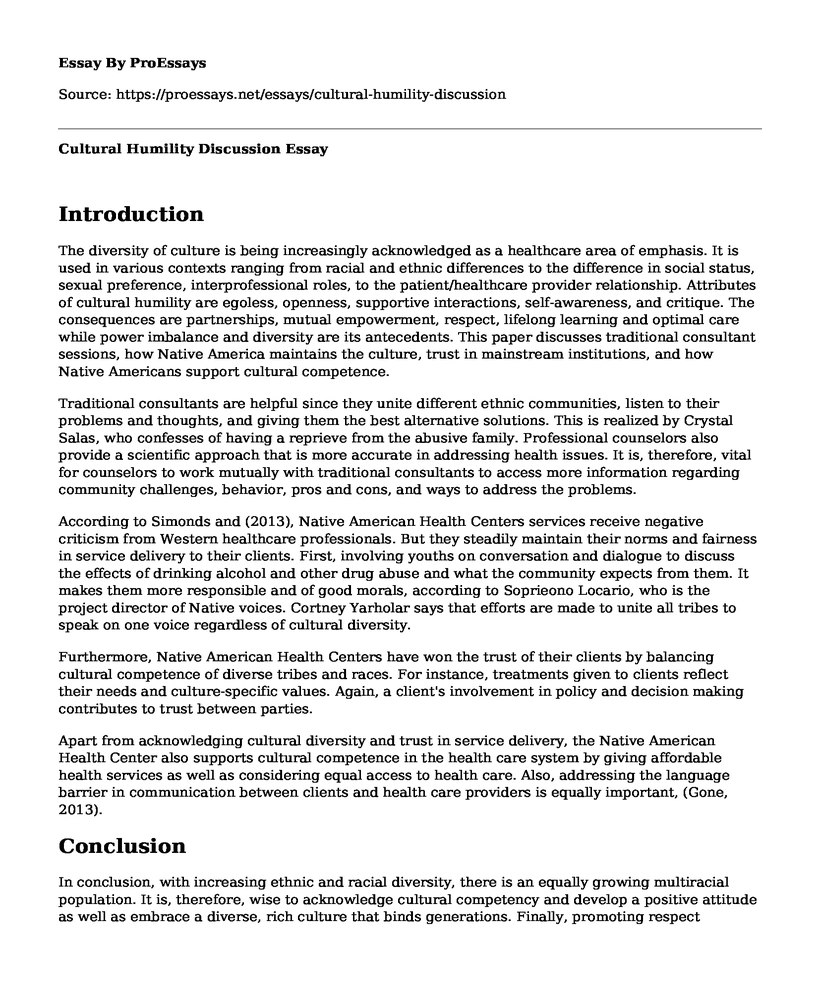Introduction
The diversity of culture is being increasingly acknowledged as a healthcare area of emphasis. It is used in various contexts ranging from racial and ethnic differences to the difference in social status, sexual preference, interprofessional roles, to the patient/healthcare provider relationship. Attributes of cultural humility are egoless, openness, supportive interactions, self-awareness, and critique. The consequences are partnerships, mutual empowerment, respect, lifelong learning and optimal care while power imbalance and diversity are its antecedents. This paper discusses traditional consultant sessions, how Native America maintains the culture, trust in mainstream institutions, and how Native Americans support cultural competence.
Traditional consultants are helpful since they unite different ethnic communities, listen to their problems and thoughts, and giving them the best alternative solutions. This is realized by Crystal Salas, who confesses of having a reprieve from the abusive family. Professional counselors also provide a scientific approach that is more accurate in addressing health issues. It is, therefore, vital for counselors to work mutually with traditional consultants to access more information regarding community challenges, behavior, pros and cons, and ways to address the problems.
According to Simonds and (2013), Native American Health Centers services receive negative criticism from Western healthcare professionals. But they steadily maintain their norms and fairness in service delivery to their clients. First, involving youths on conversation and dialogue to discuss the effects of drinking alcohol and other drug abuse and what the community expects from them. It makes them more responsible and of good morals, according to Soprieono Locario, who is the project director of Native voices. Cortney Yarholar says that efforts are made to unite all tribes to speak on one voice regardless of cultural diversity.
Furthermore, Native American Health Centers have won the trust of their clients by balancing cultural competence of diverse tribes and races. For instance, treatments given to clients reflect their needs and culture-specific values. Again, a client's involvement in policy and decision making contributes to trust between parties.
Apart from acknowledging cultural diversity and trust in service delivery, the Native American Health Center also supports cultural competence in the health care system by giving affordable health services as well as considering equal access to health care. Also, addressing the language barrier in communication between clients and health care providers is equally important, (Gone, 2013).
Conclusion
In conclusion, with increasing ethnic and racial diversity, there is an equally growing multiracial population. It is, therefore, wise to acknowledge cultural competency and develop a positive attitude as well as embrace a diverse, rich culture that binds generations. Finally, promoting respect between races, abilities, ages, education level, class, income, and faith will create cultural coexistence.
References
Gone, J. P. (2013). Redressing First Nations historical trauma: Theorizing mechanisms for indigenous culture as mental health treatment. Transcultural psychiatry, 50(5), 683-706.
Simonds, V. W., & Christopher, S. (2013). Adapting Western research methods to indigenous ways of knowing. American Journal of Public Health, 103(12), 2185-2192.
Cite this page
Cultural Humility Discussion. (2022, Jul 25). Retrieved from https://proessays.net/essays/cultural-humility-discussion
If you are the original author of this essay and no longer wish to have it published on the ProEssays website, please click below to request its removal:
- Generational Differences in Levels of Control Held Among Family Businesses Approaching System
- Essay Sample on Cancer and the Family
- Research Paper on Marriage, Kinship, and Family
- Essay on Grandmothers as Primary Caregivers: African-American and Other Communities
- Pop Culture Artifacts: Meaning Production & Vulgarity - Essay Sample
- Essay on Rebellion: Refusing Authority, Influencing Behaviour and Breaking Family Norms
- Essay Example on Sons and Daughters: Comparing Family Roles, Body Structures & Rewards







